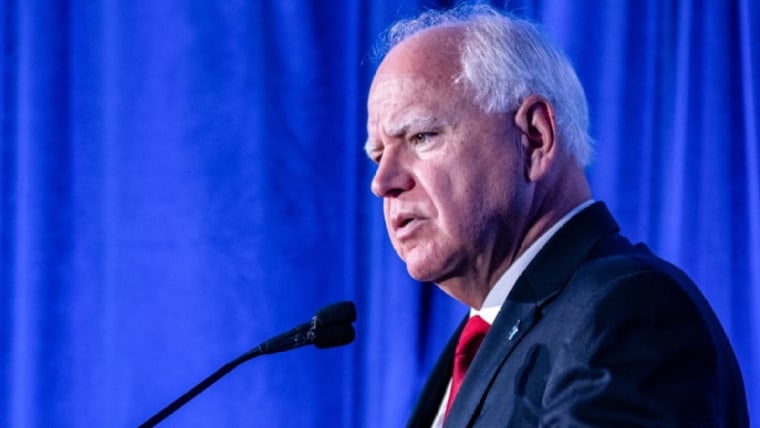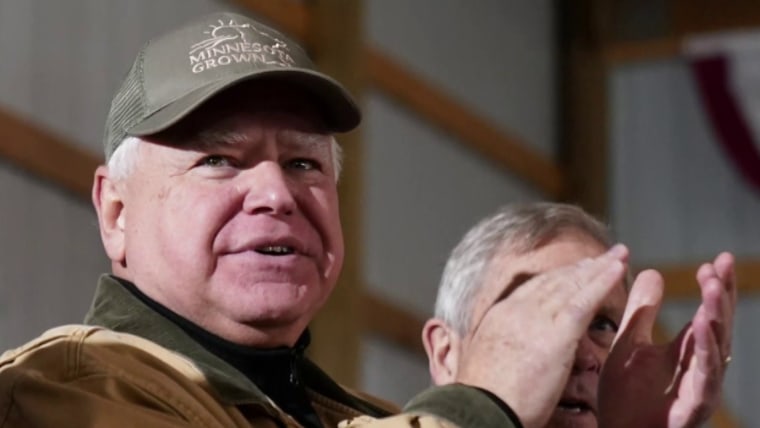“The vice president, in terms of the election, does not have any impact,” former President Donald Trump said during his disastrous appearance at the National Association of Black Journalists last week. Trump certainly hopes that bit of conventional wisdom holds true this year. Sen. JD Vance, R-Ohio, has turned out to be an unusually poor candidate by almost any criterion, to the point where Trump can’t even bring himself to say Vance is ready to be president. The story on the other side is far different. We don’t yet know how Kamala Harris’ running mate, Minnesota Gov. Tim Walz, will perform as he moves into the national spotlight. But in addition to putting his state out of reach, Walz could start undoing the Democratic Party’s weakness with precisely the people Vance was supposed to represent: rural voters, especially rural white voters.
Only about 20% of Americans live in what the Census Bureau classifies as rural areas; most of us live in cities and suburbs. But the Republican Party’s power is built on rural votes, not only through its dominance of small rural states but by virtue of its strong support in rural areas within states, including every battleground state.
Rural whites have become convinced that Democrats aren’t like them and don’t respect them.
As recently as Bill Clinton’s presidency, rural voters were roughly split between the parties. That’s changed in the last couple decades. Trump — a son of Queens who couldn’t have less life experience in common with the average rural resident — remains popular with rural Americans. He won 65% of rural votes in 2020 — and 71% of rural whites, up from 62% in 2016. In 2022, rural whites gave 74% of their votes to Republican House candidates, up from 64% four years before.
There are many reasons for this partisan gap, but the most important is that rural whites have become convinced that Democrats aren’t like them and don’t respect them. Some would say this is all Democrats’ fault, but that ignores the relentless campaign by Republicans and the conservative media to persuade rural whites that Democrats are a bunch of snooty coastal elitists who want nothing more than to destroy rural America and everything it represents.
However you apportion responsibility, the fact that Democrats are at a deep disadvantage in rural America remains. It would be lovely if Democrats could simply point out that the Biden administration has aggressively directed money to rural areas for a broad range of needs, from economic development to clean energy to broadband to infrastructure. But alas, that’s not how politics works. Democrats need messengers who can get past the skepticism — or even hostility — that so many in rural America have toward their party.

Which is where Walz comes in. “He knows how to speak our language,” says Matt Hildreth, executive director of Rural Organizing, “and understands that we want elected officials who have our backs.” In the House, Walz was one of the few Democrats who won in districts Trump won handily. Not only did he grow up in rural Nebraska, as Trump might say, he is straight from central casting for the role of “Midwestern Dad.” Try to imagine Donald Trump looking happy holding a piglet.
Walz also has another skill: a talent for presenting complex issues in terms that are straightforward and easy to understand. This is something that Democratic leaders, who love nothing more than a detailed policy discussion, have often lacked. He has as strong a liberal record as any governor in the country, but you’d also be hard-pressed to find a Democrat who could win more converts at an agricultural fair.
It isn’t enough to tell rural voters that the party they’ve been rejecting has something to offer them.
The way for Democrats to regain lost ground in rural areas, Walz told Ezra Klein of The New York Times, “is with optimism and a sense of grace toward folks.” But he isn’t afraid to make a strong case against Republicans; he can stick in a shiv and do it with a smile. He is deft at dishing out strong criticism of his opponents without sounding mean or condescending.
Which is exactly what Democrats need in rural areas. It isn’t enough to tell rural voters that the party they’ve been rejecting has something to offer them; they also have to be convinced that they’ve been betrayed by a GOP that offered them nothing but culture war provocation and resentment. And the truth is that the fact that Walz still looks like the football coach he once was means people are less likely to perceive him as unusually liberal.
If nothing else, Walz can at least begin to change the conversation around rural politics, to force Republicans to answer for their neglect of rural America. If he can persuade rural voters to start asking the Republicans who represent them up and down the ballot, “What have you done for us lately?” it would create the conditions for some long-overdue political competition in rural America.
That would help Democrats, and it would help rural people, too. For too long, they’ve been getting nothing in return for their votes. If Tim Walz can show them a different path, everybody wins. Except Donald Trump.

